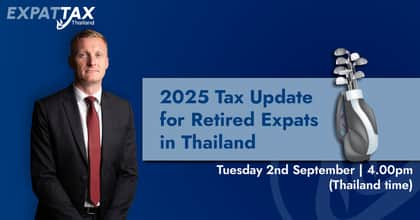
Thailand’s new Destination Thailand Visa (DTV) is set to transform the landscape for digital nomads, remote workers, and long-term visitors. Recently announced by the Thai government, the DTV aims to attract skilled professionals and stimulate the country’s economy and tourism sector. With a five-year validity, the visa allows for multiple entries and a maximum stay of 180 days per entry, offering unprecedented flexibility for those looking to work and live in Thailand.
While the DTV’s benefits are clear, understanding the tax implications is crucial for potential visa holders. Navigating the complexities of tax residency, obligations, and exemptions can be challenging but essential for making informed decisions. This article delves into the tax aspects of the DTV, providing clarity and guidance for those considering this new visa option.
Overview of the Destination Thailand Visa (DTV)
The Destination Thailand Visa (DTV) is a new initiative by the Thai government aimed at attracting skilled professionals, remote workers, and long-term visitors to the country. This visa offers individuals the opportunity to live and work in Thailand while enjoying the country’s rich cultural heritage and vibrant lifestyle.
DTV Eligibility Criteria and Application Process
To be eligible for the DTV, applicants must:
- Be at least 20 years old.
- Provide proof of employment with a registered company, ensuring eligibility for digital nomads and remote workers.
- Demonstrate a minimum financial reserve of 500,000 THB (approximately $13,650).
The application process involves submitting necessary documentation through the Thai Ministry of Foreign Affairs’ E-visa portal. The Ministry of Foreign Affairs website provides detailed steps and requirements.
Benefits of the DTV
The DTV offers several benefits designed to make long-term stays in Thailand more appealing:
- Flexibility: The visa allows for multiple entries, enabling holders to travel freely in and out of Thailand.
- Extended Stay: With a validity of five years and the ability to stay for 180 days per entry, visa holders have considerable flexibility in planning their stay.
- Family Inclusion: The visa allows legal dependents, such as spouses and children under 20, to accompany the primary visa holder.
- Work Opportunities: Remote work for international clients is permitted without the need for a local work permit.
Destination Thailand Visa Key Features
- 5-Year Validity: The DTV is valid for five years, providing long-term stability for residents.
- 180-Day Stay per Entry: Holders can stay in Thailand for up to 180 days per entry, with an option to extend for an additional 180 days.
- Multiple Entries: The visa allows multiple entries, offering flexibility for those with international commitments.
- Family Inclusion: Spouses and children under 20 can join the primary visa holder, ensuring family unity during extended stays.
This new visa aims to enhance Thailand’s appeal as a destination for skilled professionals and remote workers, contributing to the country’s economic growth and tourism.
Tax Residency Rules in Thailand
Understanding tax residency rules is crucial for anyone considering a long-term stay in Thailand under the Destination Thailand Visa (DTV). In Thailand, tax residency is defined by the duration of an individual’s physical presence in the country within a calendar year. Individuals are considered residents if they reside in Thailand for a period or periods totalling 180 days or more during a calendar year.
General Tax Obligations for Residents and Non-Residents
Tax obligations in Thailand vary based on residency status:
Tax Residents
- Tax on Overseas Income: Tax residents are taxed on overseas income remitted into Thailand. It should be noted that not all income is taxable. Click here for more details on assessable foreign-sourced.
- Tax on Thai Sourced Income: All Thai sources of income are taxable.
Non-Residents
- Thai-Sourced Income: Non-residents are only taxed on income derived from sources within Thailand.
- Overseas Remittances: Any money transferred from overseas is tax-free for non-tax residents
Are DTV Holders Tax Residents?
There are conflicting claims regarding the tax status of DTV holders, with some sources suggesting there are no tax obligations. Unlike Thailand’s Long-Term Resident (LTR) Visa, which exempts certain categories from tax by Royal Decree, the DTV visa offers no such benefits. Staying for 180 days or more qualifies a DTV holder as a tax resident, making them liable for tax on funds brought into Thailand during their stay. To avoid tax obligations, we advise DTV holders to limit their time in Thailand to 179 days per year.
DTV Tax Exemptions and Benefits
Short-Term Stays
- Avoiding Tax Residency: DTV holders who limit their stay to under 180 days can avoid becoming tax residents. Consequently, they are only subject to Thai taxes on income earned within Thailand and enjoy exemptions on foreign income.
- Strategic Planning: This provision makes the DTV particularly attractive for digital nomads and remote workers who plan their stays strategically to take advantage of these tax exemptions.
Extended Stays
- Tax Residency Implications: When a DTV holder extends their stay beyond 180 days in a calendar year, they become subject to Thai tax laws on their global income. This means any income earned outside Thailand and brought into the country is taxable.
- No Royal Decree Exemptions: Unlike the Long-Term Resident (LTR) Visa, the DTV does not provide specific tax exemptions by Royal Decree. Thus, DTV holders must carefully consider their length of stay to manage their tax obligations effectively.
Potential for Confusion
- Conflicting Reports: There have been conflicting reports about the tax obligations for DTV holders, with some sources suggesting minimal tax obligations. However, it is clear that staying beyond 179 days triggers tax residency, resulting in tax liabilities and a legal requirement to file a tax return.
- Professional Guidance Recommended: DTV holders are advised to consult with tax professionals to navigate these complexities and ensure compliance with Thai tax regulations.
Tax Recommendations for DTV Holders
- Limit Stay Duration: To avoid tax residency, DTV holders should consider limiting their stay in Thailand to 179 days per calendar year.
- Seek Professional Advice: Given the nuances and potential for significant tax liabilities, consulting with a tax advisor familiar with Thai tax laws is highly recommended. This ensures that DTV holders can optimise their tax strategy and remain compliant with all regulations.
By understanding these tax implications, DTV holders can make informed decisions about their stay in Thailand, balancing the benefits of the visa with their tax obligations.
If you would like to discuss the tax implications of the DTV, book a call with our support team who will be happy to help.
Tax Planning Strategies for DTV Holders
Maintaining Clear Records
To effectively manage your tax residency status while holding a Destination Thailand Visa (DTV), it is crucial to maintain clear and accurate records of your days spent in Thailand. Keeping detailed records helps prove your non-resident status if needed and ensures compliance with Thai tax regulations. Tracking of your days in Thailand is essential, and we strongly recommend using digital tools to avoid any unintended overstay.
Managing Tax Liabilities
- Limit Stay Duration: One of the most effective strategies to avoid becoming a tax resident in Thailand is to limit your stay to 179 days or less in a calendar year. This prevents triggering the tax residency status and keeps your tax obligations limited to income earned within Thailand.
- Travel Planning: Plan your international travel to ensure that your stay in Thailand does not exceed the 179-day limit. Being mindful of your travel schedule can help you maintain your non-resident status and avoid additional tax liabilities.
- Tax Planning: If you do incur a tax liability, be sure you understand the rules on foreign-sourced income and the implications of Double Tax Agreements to ensure you are not taxed twice. Explore the extensive resources and insights on this website to help you make informed decisions about your tax affairs in Thailand
- Consult a Tax Advisor: If you are unsure about how to proceed or need help navigating the Thai tax system, speak with a specialist. You can arrange a free initial call with our support team here.
Tax Considerations for DTV Digital Nomads and Remote Workers
Remote Work Tax Implications
For digital nomads and remote workers considering the Destination Thailand Visa (DTV), understanding the tax implications of remote work is crucial:
- Working for International Clients: DTV holders can work remotely for clients outside of Thailand without incurring local tax liabilities, provided they stay less than 180 days. This feature is particularly attractive for digital nomads who generate income from international sources.
- Prohibition on Local Employment: While remote work for international clients is permitted, DTV holders are not allowed to engage in local employment without the appropriate visa and work permit. Engaging in local employment without proper authorization can lead to legal issues and tax complications.
Avoiding Double Taxation
- Understanding Tax Treaties: Thailand has tax treaties with many countries to prevent double taxation. These treaties can help DTV holders avoid being taxed twice on the same income by both Thailand and their home country. Familiarise yourself with the specific tax treaty between Thailand and your home country to understand your rights and obligations.
- Tax Credits and Exemptions: Utilise tax credits and exemptions available under these treaties to reduce your overall tax burden. These provisions can significantly impact your tax planning and financial strategy.
Practical Tips
- Consult a Tax Professional: Given the complexity of international tax laws and the potential for double taxation, it is highly recommended that you consult with a tax professional who understands both Thai tax laws and the tax laws of your home country.
- Stay Informed: Stay abreast of any changes in tax regulations in Thailand and your home country. This proactive approach will help you adjust your tax planning strategies as needed.
By understanding and addressing these practical considerations, digital nomads and remote workers can effectively manage their tax obligations while enjoying the benefits of living and working in Thailand under the DTV.
Summing Up
The new Destination Thailand Visa (DTV) offers significant benefits for digital nomads, remote workers, and long-term visitors. However, understanding the tax implications is essential to make the most of this opportunity. By staying informed about tax residency rules, managing your stay duration, and seeking professional advice, you can optimise your tax strategy and ensure compliance with Thai regulations.
For personalised advice and more detailed information on managing your taxes as a DTV holder, contact us to book a call with our team – we’re here to help.


